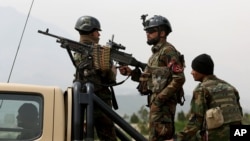The Taliban says it has launched its annual spring military offensive in Afghanistan, titled “Omari Operation.”
In a statement sent to reporters Tuesday, the Islamist insurgent group promised “large scale attacks on enemy positions, martyrdom-seeking (suicide) and tactical attacks against enemy strongholds and assassination of enemy commanders in urban centers.”
The Taliban said the operation has been named after its deceased leader Mullah Omar, and is part of its 15-year-old “jihad against the American invasion” and effort to reestablish an Islamic system in Afghanistan.
“With the advent of spring it is again time for us to renew our Jihadi determination and operations,” the insurgent group said.
Taliban inflicted heavy losses in 2015
The Taliban inflicted heavy casualties on Afghan security forces during the 2015 fighting season, killing nearly 6,000 personnel, including soldiers and police, while another 14,000 were wounded. The militant group also captured more territory then at any point since it was ousted from power in 2001 for harboring al-Qaida.
The U.S.-led military coalition ended its combat mission in 2014, leaving behind some 13,000-troops, mostly Americans, to train Afghan forces and conduct counterterrorism operations.
Afghan leaders blame the withdrawal of international forces for the battlefield and other losses but have vowed to evict Taliban insurgents from areas they now control and keep them from making advances this year.
Peace talks stalled
The U.S., China and neighboring Pakistan all joined hands with Afghanistan to try to arrange peace talks between the Taliban and the Kabul government in early March to prevent the insurgents from launching the spring offensive.
But the Taliban refused to attend and there are fears this year’s fighting could see more bloodshed in the war-ravaged country.
Afghanistan blames Pakistan
Afghan officials in recent days have alleged that despite its efforts to help in Afghan peace efforts, Pakistan has not taken action against Taliban leaders and their sanctuaries on the other side of the border, charges Islamabad rejected.
It is widely perceived that Taliban commanders are using Pakistani areas, including its southwestern border province of Baluchistan for directing hostilities in Afghanistan. The head of the Afghan intelligence agency recently told the national parliament that the neighboring country's military spy agency is behind the resurgent Taliban.
The insurgent group has made significant advances in the southern Helmand province, which borders Baluchistan. Local Afghan commanders say that five out of 14 districts of the largest poppy-producing Afghan province are under the Taliban's control, while fighting has been waging in several other districts.












